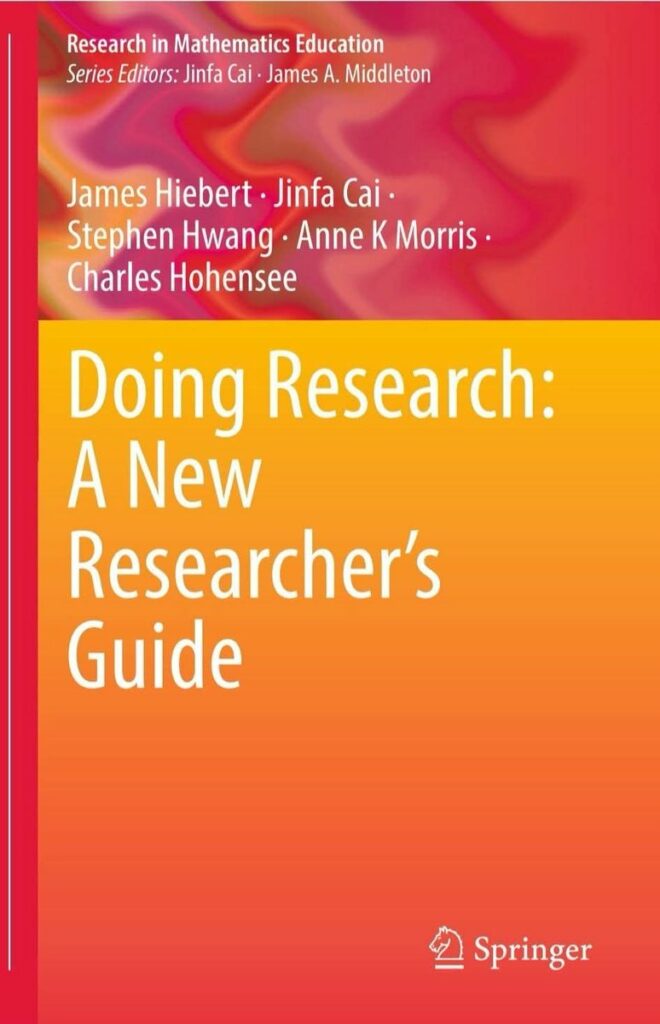
Free download: https://link.springer.com/chapter/10.1007/978-3-031-19078-0_2
This book is a practical guide for doing research written for beginning researchers. You might be a doctoral student just learning how to conduct research. Or, you might be a new faculty member, having recently graduated from a doctoral program and looking forward to conducting research as part of your job. Or, you might be a postdoctoral fellow pursuing a new research agenda.
Although the target audience is beginning researchers, we believe more experi
enced researchers will find something useful as well. Indeed, we were surprised by how much we learned writing this book. As we were searching for ways to present the ideas, we realized that many of the concepts and procedures we describe are less about learning a set of rules and more about reasoning through a complicated but logical process. And getting better at reasoning is a lifelong journey. So, if you are a beginning researcher or someone more experienced, we hope you will learn some thing new and reflect on your own reasoning about the research process.
We are mathematics educators, so we use examples from mathematics teaching and learning, but we believe the practical guidelines we recommend apply to most content areas and domains of educational research. There is nothing special about mathematics with regard to the logic of the research process we describe.
The book can be used as a supplemental textbook in a graduate-level research methods course, as a primary textbook in a course on conducting research in (mathematics) education, and as a self-study guide for individuals or small groups of researchers who want to review and reconsider the key elements of the research process. The book includes exercises designed to engage you in working through the processes we describe. The narrative is punctuated with tips for researchers and recommendations for other sources to consult along the way.
We encourage you to work through the study exercises. You will learn more than you would otherwise. In the exercises, you will be asked to respond to specific questions designed to help you make progress in planning and conducting your study, and in writing your report of the study. For some questions, we will ask you to update your responses as you read succeeding chapters. You will be asked to try out specific aspects of conducting your study as well as writing a paper based on your study, and to write out examples to illustrate and sharpen the ideas presented in the text.
Many books on research methods are created as reference books; you can learn about a particular aspect of research by selecting and reading particular pages. This book is different. It is more like a story that develops as each idea builds on what came before. Individual chapters or sections will not make much sense unless the book is read as a whole, from the beginning to the end.
We treat conducting a research study and writing a research report as mutually beneficial processes. Consequently, the book includes suggestions for writing alongside doing research. Writing can be used to help you think through research issues, make more explicit your own thinking, and push your thinking forward. Writing also is used to communicate your research study to others. We address writing for both purposes.
One advantage we had writing this book came from our experience as a former editorial team for one of the leading journals in mathematics education—the Journal for Research in Mathematics Education. A major benefit of this experience is knowing what reviewers are likely to say. You can expect to receive the kind of feedback we examined regardless of which journal is reviewing your paper. Which features of papers do reviewers like and which features cause problems? At key points in the book, we cite information from reviewers to give you an inside look at what is expected if you want to get your work published.
We intend this book to be easy to read but challenging to complete. We believe the basic principles for conducting research are logical and quite easy to understand, but we also know that doing research can be difficult and even intimidating, especially in enormously complex fields like education. We hope you find this book useful in managing this complexity and helpful in guiding you through the challenging but exciting and rewarding work of educational research